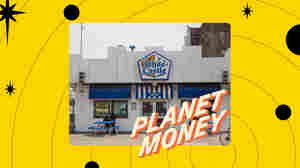Wanna go deeper? Subscribe to Planet Money+ and get sponsor-free episodes of Planet Money, The Indicator, and Planet Money Summer School. Plus access to bonus content. It's a new way to support the show you love. Learn more at plus.npr.org/planetmoney


Planet Money
From NPR
Wanna see a trick? Give us any topic and we can tie it back to the economy. At Planet Money, we explore the forces that shape our lives and bring you along for the ride. Don't just understand the economy – understand the world.
Wanna go deeper? Subscribe to Planet Money+ and get sponsor-free episodes of Planet Money, The Indicator, and Planet Money Summer School. Plus access to bonus content. It's a new way to support the show you love. Learn more at plus.npr.org/planetmoney
Most Recent Episodes
How useful, really, are the steps you can take after a data breach?
How useful, really, are the steps you can take after a data breach?
WASHINGTON, DC - MARCH 26: U.S. President Donald Trump displays a signed an executive order in the Oval Office of the White House on March 26, 2025 in Washington, DC. President Trump announced 25% tariffs on all foreign-made cars. Win McNamee/Getty Images hide caption
The Planet Money mystery diamond Sarah Gonzalez/Sarah Gonzalez hide caption
Howard Lutnick, US commerce secretary, speaks to reporters following President Trump's joint address to Congress on March 04, 2025 in Washington, DC. Tierney L. Cross/Getty Images hide caption
Empty pocket. CafeCredit/"Empty Pocket" hide caption
Tupperware products are offered for sale at a retail store on April 10, 2023 in Chicago, Illinois. Scott Olson/Getty Images hide caption
FILE - President Bill Clinton, left, and Vice President Al Gore walk past two forklifts carrying reams of federal rules and regulations prior to making their reinventing government announcement, Sept. 7, 1993, at the White House in Washington. J. SCOTT APPLEWHITE/AP hide caption









